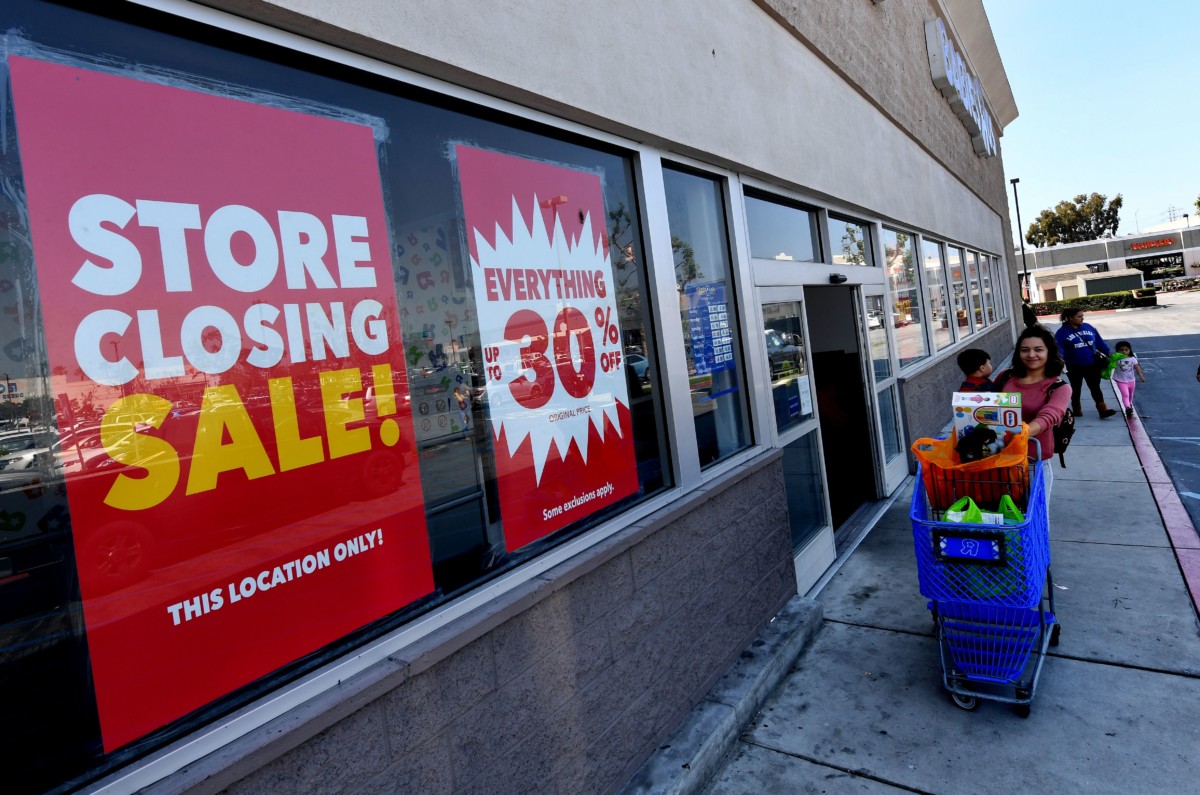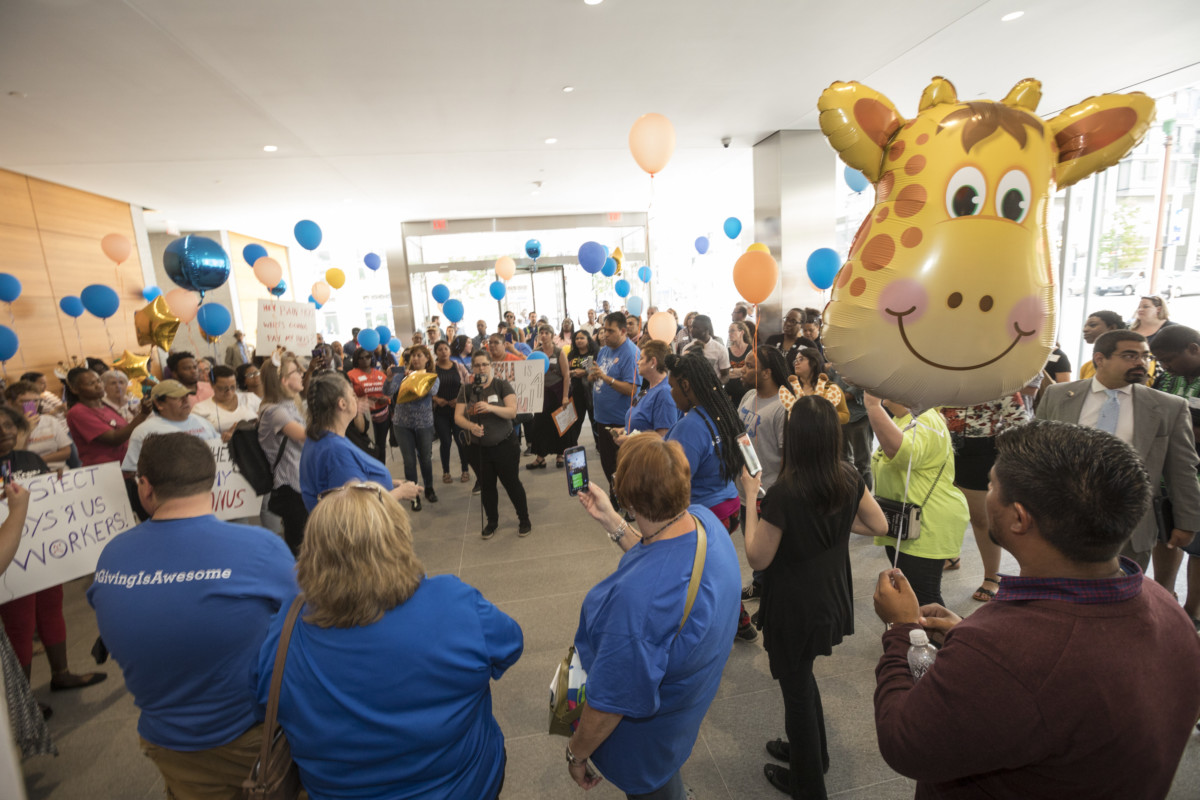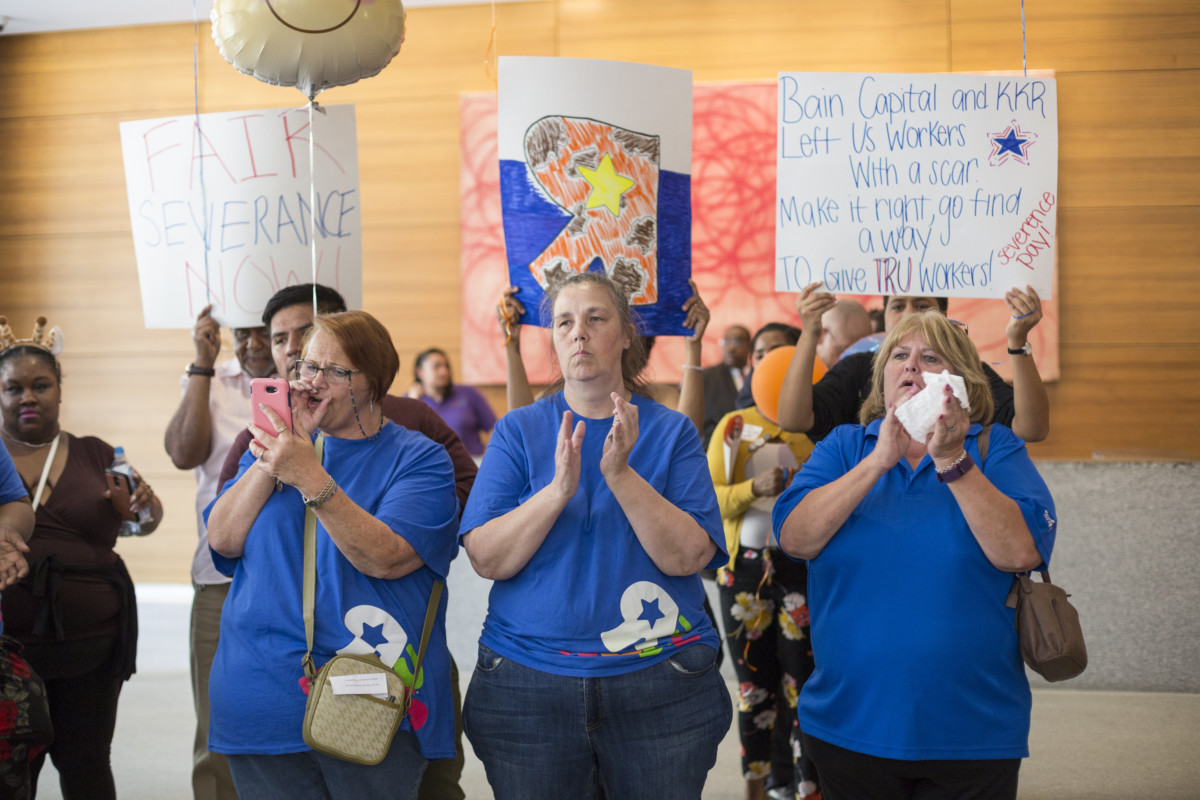
Today we bring you a conversation with Debbie Beard, an assistant manager at Babies “R” Us in Phoenix, Arizona, and Carrie Gleason, director of the Fair Workweek Initiative at the Center for Popular Democracy. They discuss how leveraged buyout of Toys “R” Us hurt tens of thousands of retail workers and how a new campaign is fighting back to demand justice for these employees.
Sarah Jaffe: Start out, Debbie, tell us about your time at Toys “R” Us and Babies “R” Us, and what has changed with the company over time?
Debbie Beard: I have been here 29 years. I started as a seasonal employee. I walked in and was hired in five minutes. I have pretty much held almost any position in the stores that [was] available…. It had always been a family-oriented company until it went from public to private in 2005, when Bain Capital and KKR bought out the company, along with Vornado. Once that happened, we started losing the family part of the company. They didn’t really seem to care too much about investing time in the employees or anything. They restructured, as they say, which normally happens on a buyout like that. But full-time people lost positions, benefits and things like that.
When the latest round of financial difficulties began, leading to them saying that they are going to close stores — walk us through when you heard about that, when you started to hear that there were problems and what you were thinking.
I guess it starts back in September. We knew the company was struggling…. The company put together a rally regionally for all the store managers and the assistant managers to bring them in and, at that point in time, reassured them that the company was doing fine. They were hoping to have a really great season. Then, that should pull us out of it and make it be able to continue.
January was when we heard that they … filed the Chapter 11 bankruptcy…. They went and said that they were going to try closing 182 stores at that point in time, and then hopefully be able to save the rest of them. Then, we were blindsided in March. The whole company was going into liquidation at that point.
How did you get connected with the folks at the Center for Popular Democracy and Organization United for Respect?
Actually, my store manager, Tracy, she was talking to me about it. Her and I have been together for quite some time. Both of us, pretty much the same tenure and things. She talked to me about it, and then I got on board.
Tell us what the next steps are, what the organization is doing about bringing attention to this situation, and how it is certainly not limited to Toys “R” Us, but also trying to save people’s jobs.
I know we are in the planning stages of that…. I understand there is an action happening sometime around June 1…. Carrie could probably fill you in a little more on that one.
Carrie, give us a little bit more background about what is going on broadly in retail with these companies, these buyouts from private equity firms.
Carrie Gleason: This has been going on for quite some time, and during the recession, about 10 years ago now, retail companies started to turn to these private equity firms to help them with their financial struggles. Many retail companies were bought out through this process called a “leveraged buyout.”

In the case of Toys “R” Us, what happened was, in say 2005, the company only had 30 percent debt. Then, as soon as KKR and Bain Capital bought it out, that flipped and the company went to 70 percent debt and only 30 percent equity. The company had long paid back this debt, but then, as every year, they had to pay management fees and other … fees to take care of Bain Capital from one year to the next, on top of interest, and it became financially unviable.
Then, Amazon gets on the scene and all of these investors across all of these retail companies look at what is happening with Amazon. Last year, it became the second-largest retail company in America. They thought, “Well, maybe we should get out now; it is going to take too much investment — capital investment — to make this company competitive. So, let’s just close the doors.”
The truth is that Toys “R” Us is a completely viable business. Many of these other retail companies that are closing doors, like Nine West, are completely viable businesses, but the problem is that the owners aren’t looking to run the business of retail. It is a big problem. Then, it is not just this private equity ownership. Big companies like Macy’s and Kohl’s have other kinds of debt that are really crippling them in this moment where they actually need to be changing their strategies for the new retail industry that is emerging.
As a result … a lot of people are losing their jobs. A lot of hard-working women like Debbie are losing their jobs. And this is a disaster, a financial crisis that could completely be avoided if we just regulate these Wall Street firms.
Since we are talking on Sunday and it is Mother’s Day, I should ask about the fact that it is a lot of women who work in a lot of these retail stores.
Beard: There are several single moms in my store. I get emotional about this. I am sorry…. It is just sad to see them trying to struggle, trying to find a new job to fit the criteria that they need, and not knowing what is going to happen, and no help from Bain Capital to help them get through that period until they can secure another job.
And just for a reminder, because we heard the term “Bain Capital” a lot in 2012, maybe not so much since then. But Mitt Romney is running for office again. Remind us a little bit about Bain Capital.
Gleason: I will say this isn’t the first toy store that Bain Capital destroyed. KB Toys, you might remember, also went under [under] the ownership of Bain Capital. That was further back, probably closer to the time that Mitt Romney was involved. But this is a model that Mitt Romney was at the helm of. This is a strategy that has been in play for the last 15 or so years that has made a lot of people money, including Mitt Romney.
It is a problem. It was incredibly powerful to see people who have worked, dedicated their lives to Toys “R” Us, go to DC, meet with members of Congress, meet with Bernie Sanders to tell their stories, because we are really counting on them to do something about what is happening.
What can they do? What are people asking for Congress to do on this front?
Gleason: Once upon a time, leveraged buyouts were illegal. We think the simplest solution is to just ban leveraged buyouts. They shouldn’t be allowed. We are also looking at other policies. We can go the patchwork approach or we can just get to the source of the problem. Either way, something needs to be done.

We hear the term “leveraged buyout,” but tell us what that means. When did it stop being illegal?
Gleason: I am also not an expert. I am learning about this because of what it is doing to people working in retail. A leveraged buyout means that they use the equity within a company to then give the leverage to buy a company. Based off of that equity within the company, they use the revenue from every year to pay off the debt directly to the owner. It is not like there is a bank. It is that the owners say, “We are going to put up the money now to put some money into the company and then, every year, we are just going to take a big chunk off of the revenue to pay us back over time.”
In the case of Toys “R” Us, it was a $5 billion debt that they took on. Over the course of time, KKR and Bain Capital pocketed $470 million just in fees. That was on top of the money that they put down. It is definitely a complicated process, but the idea is just that — and the result, it is not like you have the owners and then, they are beholden to the banks. So, the people in charge are still trying to run the business. They might have too much debt to these banks, but they are still trying to run the business.
The problem with leveraged buyouts is that you actually give the company over to these investors who don’t really care about running a toy business. They don’t really care about the families that are making the company successful. They are just looking to make a buck. That is the problem with leveraged buyouts.
And they made quite a few bucks.
Gleason: So much so that there was no money left for severance for the 33,000 people working for Toys “R” Us.
What can people do who are listening to or reading this and want to support the Toys “R” Us workers?
Beard: We have a group that is called RISE Up Retail. They are welcome to join and help get in the action planning when we do these action days and things like that. And just voicing their opinions. Going to their Congressman, the representative and letting them know how they feel.
I think the more voices that are heard will help … sometimes we all feel like [retail workers] are second-class citizens. We are here just to service all of them. Fortunately, most of our customers that come in — they understand what we are going through, but when you get up to the hierarchy, the corporate levels, we are just numbers on paper for them. We are here to make sure their business runs and they [couldn’t] care less what happens to us, which is very apparent by not offering any type of severance pay.
Gleason: This move for severance pay is the number one demand by 33,000 hardworking people working at Toys “R” Us. There is a petition that has taken off. People can sign the petition started by Colleen Kleven, a Toys “R” Us associate. We are going to the investors in KKR and Bain Capital. We are going to be calling on the New York City comptroller and New York State comptroller to reach out to KKR and Bain Capital to ask for their support to get workers severance pay.
There [are] going to be meetings at the big pension funds this week in Ohio and California, where Toys “R” Us associates are going to be there and say, “We need your help. Reach out to these companies. Tell them, ‘As an investor, we need you to help these workers get by. This is wrong.'”
This is long-haul. This is just the beginning. There are more people that are going to be losing these jobs because of these bad investment deals. We need to … reach out to our members of Congress and say, “We want you to do something about this. We want an economy that works. We need to really make sure there are guardrails to protect working families.”
This is just the beginning. We really see the powerful leadership of people like Debbie … these women that have dedicated their lives to Toys “R” Us as being a part of the voices that [are] really going to prevent this happening to other people.
Where can people find the petitions and the other stuff?
Gleason: The petition that is taking off is on Credo. You can reach out to your members of Congress through this page and show your support for Toys “R” Us employees.
Anything else people should know about this fight?
Beard: We just need all the help we can get. We know it is going to be a long fight. I am just grateful that we have been given the opportunity to take our plea to Congress. The organizations have been a great help and support to us. The more people we can get on board, the louder our voices will be, and it will force them to have to listen to us.
This interview has been lightly edited for clarity and length.
Interviews for Resistance is a project of Sarah Jaffe, with assistance from Laura Feuillebois and support from the Nation Institute. It is also available as a podcast on iTunes. Not to be reprinted without permission.
Press freedom is under attack
As Trump cracks down on political speech, independent media is increasingly necessary.
Truthout produces reporting you won’t see in the mainstream: journalism from the frontlines of global conflict, interviews with grassroots movement leaders, high-quality legal analysis and more.
Our work is possible thanks to reader support. Help Truthout catalyze change and social justice — make a tax-deductible monthly or one-time donation today.